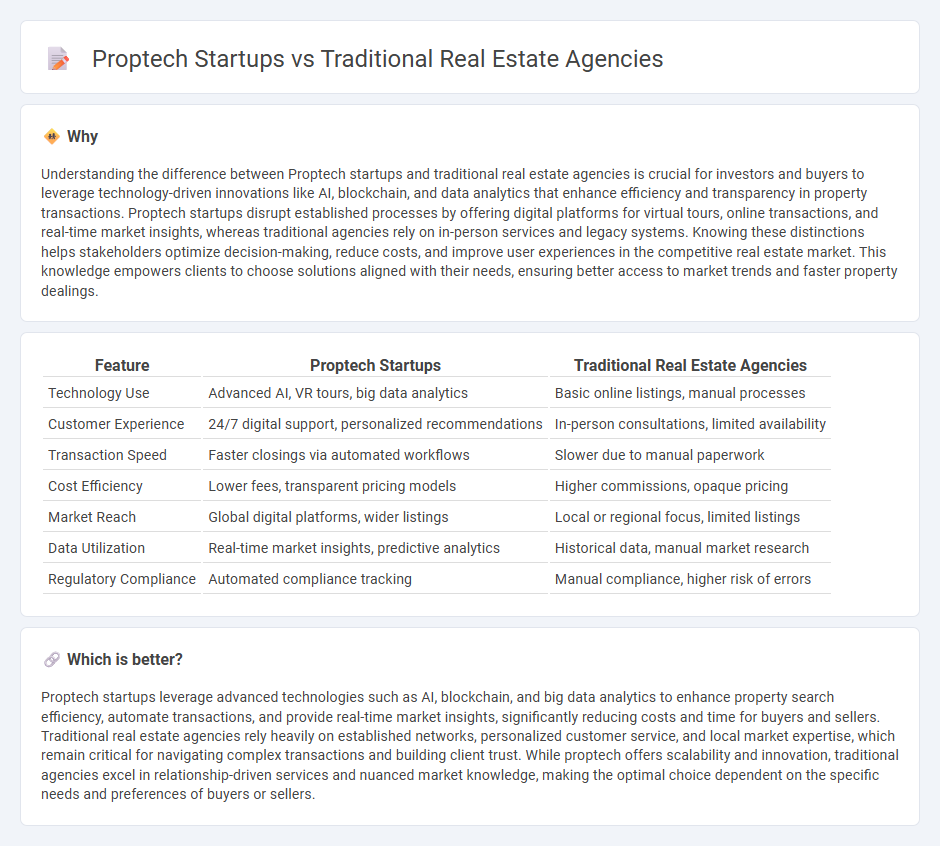
Proptech startups leverage cutting-edge technology such as AI-driven analytics, virtual reality tours, and blockchain for secure transactions to revolutionize property buying and selling processes. Traditional real estate agencies rely on established networks, personalized client relationships, and extensive market knowledge to facilitate property deals. Discover how these contrasting approaches reshape the future of real estate.
Why it is important
Understanding the difference between Proptech startups and traditional real estate agencies is crucial for investors and buyers to leverage technology-driven innovations like AI, blockchain, and data analytics that enhance efficiency and transparency in property transactions. Proptech startups disrupt established processes by offering digital platforms for virtual tours, online transactions, and real-time market insights, whereas traditional agencies rely on in-person services and legacy systems. Knowing these distinctions helps stakeholders optimize decision-making, reduce costs, and improve user experiences in the competitive real estate market. This knowledge empowers clients to choose solutions aligned with their needs, ensuring better access to market trends and faster property dealings.
Comparison Table
| Feature | Proptech Startups | Traditional Real Estate Agencies |
|---|---|---|
| Technology Use | Advanced AI, VR tours, big data analytics | Basic online listings, manual processes |
| Customer Experience | 24/7 digital support, personalized recommendations | In-person consultations, limited availability |
| Transaction Speed | Faster closings via automated workflows | Slower due to manual paperwork |
| Cost Efficiency | Lower fees, transparent pricing models | Higher commissions, opaque pricing |
| Market Reach | Global digital platforms, wider listings | Local or regional focus, limited listings |
| Data Utilization | Real-time market insights, predictive analytics | Historical data, manual market research |
| Regulatory Compliance | Automated compliance tracking | Manual compliance, higher risk of errors |
Which is better?
Proptech startups leverage advanced technologies such as AI, blockchain, and big data analytics to enhance property search efficiency, automate transactions, and provide real-time market insights, significantly reducing costs and time for buyers and sellers. Traditional real estate agencies rely heavily on established networks, personalized customer service, and local market expertise, which remain critical for navigating complex transactions and building client trust. While proptech offers scalability and innovation, traditional agencies excel in relationship-driven services and nuanced market knowledge, making the optimal choice dependent on the specific needs and preferences of buyers or sellers.
Connection
Proptech startups leverage cutting-edge technologies such as artificial intelligence, big data analytics, and blockchain to optimize property transactions, enhance customer experience, and streamline operations for traditional real estate agencies. Traditional agencies benefit from integrating proptech solutions to improve market analysis, automate listings management, and facilitate virtual property tours, driving efficiency and expanding client reach. Collaboration between these entities accelerates innovation, enabling a dynamic transformation of the real estate industry through increased transparency and data-driven decision-making.
Key Terms
Commission Structure
Traditional real estate agencies often operate on a commission structure ranging from 5% to 6% of the property sale price, which is typically shared between the buyer's and seller's agents. Proptech startups leverage technology to reduce operational costs, enabling them to offer lower commission fees, sometimes flat rates or percentage fees as low as 1% to 2%. Explore how these evolving commission models impact your real estate transactions and decision-making.
Technology Integration
Traditional real estate agencies rely on established offline methods and face-to-face interactions, often lacking advanced technology integration compared to Proptech startups. Proptech companies leverage AI, big data analytics, and blockchain to streamline property transactions, enhance customer experience, and provide virtual tours, offering competitive advantages in efficiency and transparency. Explore how technology is reshaping the real estate landscape by discovering more on this evolving industry trend.
Customer Experience
Traditional real estate agencies often rely on face-to-face interactions and established networks to build trust, while Proptech startups leverage AI-driven platforms and virtual tours to enhance customer convenience and engagement. Data analytics and mobile apps used by Proptech firms enable personalized property recommendations and faster transaction processes, reshaping the home-buying journey. Explore how technology is revolutionizing customer experience in real estate to stay ahead in this evolving market.
Source and External Links
8 Of The Best And Largest Real Estate Companies in the U.S. - This article highlights the top real estate companies like RE/MAX, Coldwell Banker, and Century 21, known for their extensive networks and market presence.
Traditional vs. Online Real Estate Broker Services - This blog discusses the differences between traditional brick-and-mortar real estate brokers and online services, focusing on personalized interactions and technology.
Alternatives to Traditional Real Estate Brokers - This article explores alternatives such as for-sale-by-owner options, flat-fee MLS services, rebate brokerages, and discount brokerages as options beyond traditional real estate agencies.
 dowidth.com
dowidth.com